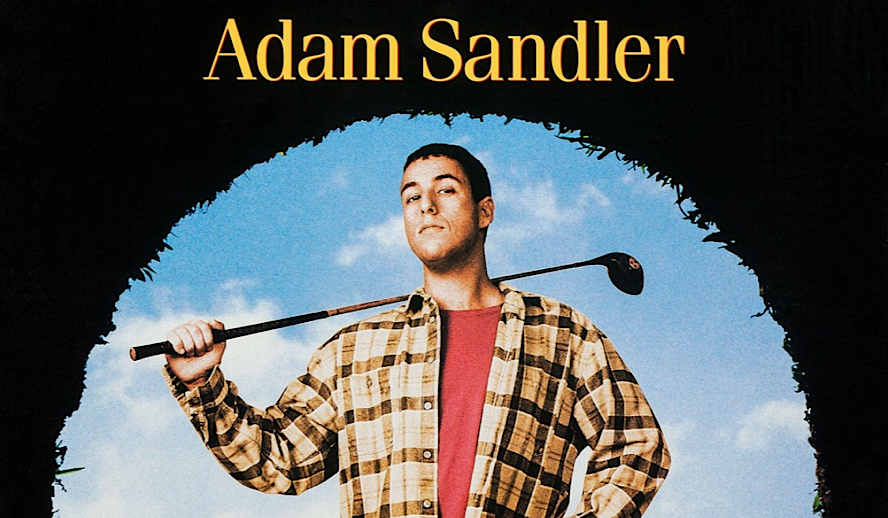Table of Contents

Photo: ‘Happy Gilmore’/Universal Pictures
“The Price is Wrong, b***h.”
‘Happy Gilmore’ has aged like a fine wine. Easily one of the funniest films to come out of the Golden Age of loud, farcical ‘90s comedies, ‘Happy Gilmore’ has remained a cultural touchstone for more than two decades, recently celebrating its 25th anniversary this past week. In the time since, ‘Happy Gilmore’ star Adam Sandler has gone from a comedian lovingly embracing the man-child persona he coined on his historic Saturday Night Live tenure into a serious dramatic actor, with groundbreaking roles in Paul Thomas Anderson’s “Punch-Drunk Love,” Judd Apatow’s “Funny People,” and especially his nerve-racking turn in the Safdie Brothers’ seedy New York thriller “Uncut Gems.” The latter earned Sandler serious awards buzz, with many feeling as if he was unjustifiably snubbed by the Academy of Motion Picture Arts & Sciences, as well as the Hollywood Foreign Press, for his incredible turn as jewelry salesman Howard Ratner.
Related article: It’s Time To Admit Adam Sandler is a Great Actor
Related article: Review: Adam Sandler’s ‘Uncut Gems’ is an Adrenalin-Filled Cinematic Gem
Sandler still makes comedies, sure (2020’s Netflix comedy Hubie Halloween received a surprisingly positive reception and decent streaming numbers, especially considering some of the lackluster comedic outings Sandler had in the late-2000s and early 2010s), but comedy doesn’t appear to be in Sandler’s future as an actor. He has completely revived his career at this point because of films like “Uncut Gems,” and despite Sandler’s playful tone regarding future projects (he once joked that he was going to make a film “so bad on purpose” if he didn’t win any awards for his performance as Ratner), I would be surprised if he abandoned serious roles following his last dramatic performance’s overwhelming reception.
How Did We Get Here?
So, what I want to talk about today is “how did we get to this point?” Rather, how has an actor like Sandler, who was seen (perhaps unfortunately and unfairly) as a joke for most of his career, undergone such a radical transformation? Well, the answer is simple: Sandler’s leveraging of his widely-known and accepted manchild persona that became so synonymous with his early career schtick is now being used as a means to further explore the psychological and social implications of these kinds of characters. He is essentially commenting on who people thought he was as a performer in his early work, through his recent dramatic stuff, and it’s been happening in the background of his career basically since he hit it big with “Happy Gilmore.”
Subscribe to Hollywood Insider’s YouTube Channel, by clicking here.
‘Happy Gilmore’ and Sandler’s Early Work
At this point, we probably all know the story of “Happy Gilmore.” It’s not an overly subversive film in terms of plot or structure, as it follows a goofy, out-of-control hockey player as he tries to convert his slapshot into a golf drive, upsetting the status quo of the yuppie golf community in the process. It’s a classic formula that Sandler had already perfected in his previous film, 1995’s irreverent comedy “Billy Madison,” and one he would mostly stick to throughout many of his early movie roles: a manchild has to be taught responsibility by a mentor (Carl Weathers’ Chubbs, in the case of “Happy”), as the manchild shows his older, snobbier colleagues that it’s okay to be a kid sometimes.
The stories are simple and effective, with clear morals and messaging, but the plots are really just vehicles for Sandler to break into manic outbursts whenever the opportunity arises (the scene of him screaming at the golf ball on national television in “Gilmore” remains one of the funniest comedy sequences I’ve ever seen). “Gilmore” works because of the universality and simplicity of its messaging, and was a perfect early sign of Sandler’s ability to rile up a crowd and get an audience on his high-energy wavelength.
Gilmore and Sandler’s other roles during this time are consistent with the persona he constructed during his time on Saturday Night Live. Alongside fellow comedians Chris Farley, David Spade, and Chris Rock, Sandler became one of the premier faces of the program in the ’90s, as part of a lineup known for not being afraid of embracing absurdity and immaturity. But these early SNL and film roles also sort of boxed Sandler in as a performer, with many people seeing him as the bratty kid in elementary school who couldn’t sit still.
Related article: The Power of Positivity: Ikorodu Bois + Chris Hemsworth + Russo Brothers + Sam Hargrave
Limited Time Offer – FREE Subscription to Hollywood Insider
Despite his films consistently doing well at the box office, critics often wrote Sandler off as an actor, thinking he was incapable of occupying other lanes or creating more thoughtful content (despite some actual dramatic heavy-lifting in romantic comedies like “The Wedding Singer,” “Spanglish,” and “50 First Dates”). Sandler, still receiving financial success, leaned further into his controversial persona as his career continued, but also started to appear like a ticking time bomb in his comedies, with films like “Big Daddy” and especially “Anger Management” demonstrating a more angry edge, hinting that there might be more to his performance style than was being shown.
‘Punch-Drunk Love’ and Sandler’s First Foray Into Drama
Then along came Paul Thomas Anderson. The visionary director, then known for epic dramatic masterpieces such as “Boogie Nights” and “Magnolia,” was apparently a huge fan of Sandler’s comedy, and recognized the aching soul that lay at the heart of Sandler’s routine. Anderson approached Sandler for a role in his new romantic drama “Punch-Drunk Love,” and it was with this role that Sandler began his transition into a full-fledged dramatic performer. The film is similar to a lot of Sandler comedies in terms of plot and structure (a manchild must learn to grow up in order to maintain his relationship), but the key difference is the context the film takes. “Punch-Drunk Love” is essentially a film about Sandler the man, as the toxic and aggressive outbursts that are synonymous with his comedy, are played far more seriously, showing the emotional toll it takes on Sandler and those around him. It’s not my favorite Sandler or Anderson, but it was nonetheless a very important first step for Sandler in the embrace of his drama.
Related article: Hollywood Insider’s CEO Pritan Ambroase: “The Importance of Venice Film Festival as the Protector of Cinema”
Related article: The Masters of Cinema Archives: Hollywood Insider Pays Tribute to ‘La Vie En Rose’, Exclusive Interview with Director Olivier Dahan
Sandler Deals With Complacency and Critical Rejection
In the years following “Punch-Drunk Love,” Sandler’s tastes began to shift even further, as his comedy work began to appear more haphazard, with “Blended” and the “Grown Ups” films reading less like actual movies and more as opportunities for Sandler to go on a cool vacation and hang out with his buddies. Not that there’s anything wrong with that necessarily, it just was evident that Sandler was starting to lose interest in these kinds of simplistic roles, and was looking for something more substantive. These films, along with the universally-derided “Jack and Jill” and “The Ridiculous 6” (the latter of which was so offensive I almost couldn’t finish it), marked a downturn for Sandler in terms of his comedy, as he seemed to almost be playing into his larger persona, rather than commenting on it.
But between these low-brow, low-effort comedies, Sandler made a few key appearances in other dramas, playing a trauma-riddled man reeling from emotional devastation after the events of September 11th, 2001 in “Reign Over Me.” Again, not an amazing film, but it nonetheless demonstrated Sandler’s ability to portray broken men who are unable to come to terms with their own issues. “Reign Over Me” also reads as an analogue for Sandler himself, as his character feels powerless under the weight of his inadequacies, even though a lot of his problems are out of his control. It’s the kind of film that sneaks up on you, quietly delivering softer moments that build up as his relationship with his friend (an also-amazing Don Cheadle) develops over the course of the movie.
Related article: ‘Duel’: A Look Back at Steven Spielberg’s Directorial Debut Almost Fifty Years After Its Original Release
Related article: A Tribute to Stan Lee: The Man Who Invented The Great American Pantheon – Superheroes!
“Funny People” marked an even more significant moment in Sandler’s career, as like “Punch-Drunk Love,” the movie seemed to both be a comment on his own career, as well as an admittance of guilt, in regards to his career complacency. Sandler plays a washed-up former comedian who finds out he is dying of cancer and decides that he must fix his relationships and cement his legacy by working with a younger comedian (an equally great Seth Rogen), who was inspired by him. Here, Sandler is firmly juxtaposed with Rogen, who embraces the same sort of immature schtick Sandler is famous for, but in a more self-deprecating and self-aware way, forcing Sandler to look inward at his own career and come to terms with some of his more problematic behavior, both in his personal life and his work. It’s a fascinating movie, for both Sandler and Rogen (who has to examine his affinity and hero worship for such a tortured artist, upon being put in his close vicinity) and one that I think deserves some re-appraisal, as many audiences likely weren’t ready for the more dramatic edge the movie presents, given the talent involved.
‘Uncut Gems’: Sandler Comes Full-Circle
If “Happy Gilmore” laid the groundwork for the Sandler manchild archetype, and “Punch-Drunk Love” and “Funny People” explored the greater implications of this kind of character, then A24’s “Uncut Gems,” which co-starred Kevin Garnett, Julia Fox, The Weeknd, Idina Menzel, and LaKeith Stanfield, is the completion of this arc in Sandler’s career. Here is a film that is inherently about the worst aspects of a Sandler-like character: he is a greedy, self-obsessed, narcissistic manbaby who will do whatever it takes to find some sort of rush or high, no matter the consequences. Howard Ratner is the kind of guy who doesn’t think ahead, or consider how his actions might affect those he cares about: he is a man driven by pure ego and will burst into an uncontrollable rage if he is challenged in any way about his poor decision-making (like when he punches The Weeknd square in the face at a nightclub, a take that was apparently not staged). Sandler revels in the most toxic elements of his own classic characters in Ratner, a dark reflection of what happens if that kind of person never received any help or guidance.
Related article: Bigger than Ant-Man: A Tribute to Paul Rudd – The Winner’s Journey
Related article: A Tribute to Mads Mikkelsen: How the Delectable Dane Conquered Hollywood
The performance feels like a culmination of Sandler’s entire career up until this point, with the seeds laid firmly in older films like “Happy Gilmore,” like in the aforementioned scene where Happy breaks into a violent fit of anger after failing to sink a putt. “Uncut Gems” embraces these insane and uncomfortable tendencies, and offsets them with more subtle moments of conniving villainy, as Sandler conveys the deep-seated sickness of Ratner through tiny, manipulative interactions with other people in his life. It’s almost fitting that he was so unanimously snubbed from major awards contention: his performance transcends the content of those types of events, and I doubt someone like Ratner would even care if he was offered a spot at the show unless it came with a bag of drugs and $10,000 for Howard to gamble on him winning.
All in all, “Happy Gilmore” isn’t just a great comedy, and Adam Sandler isn’t just a great comic. The movie has remained so important for 25 years not because it’s funny or has a kooky script or lead performance: the movie exists as a time capsule of who Adam Sandler was at the time of its conception, and is a perfect mirror to the kind of roles Sandler would take going forward. If you had asked any critic in 1996 if they thought a film like “Happy Gilmore” would be this revelatory, almost 30 years after its release, they probably would laugh in your face. Yet, here we are, still talking about this bizarre Adam Sandler sports comedy, finally treating it as the landmark moment it was, and still is.
By Patrick Nash
Click here to read Hollywood Insider’s CEO Pritan Ambroase’s love letter to Black Lives Matter, in which he tackles more than just police reform, press freedom and more – click here.
An excerpt from the love letter: Hollywood Insider’s CEO/editor-in-chief Pritan Ambroase affirms, “Hollywood Insider fully supports the much-needed Black Lives Matter movement. We are actively, physically and digitally a part of this global movement. We will continue reporting on this major issue of police brutality and legal murders of Black people to hold the system accountable. We will continue reporting on this major issue with kindness and respect to all Black people, as each and every one of them are seen and heard. Just a reminder, that the Black Lives Matter movement is about more than just police brutality and extends into banking, housing, education, medical, infrastructure, etc. We have the space and time for all your stories. We believe in peaceful/non-violent protests and I would like to request the rest of media to focus on 95% of the protests that are peaceful and working effectively with positive changes happening daily. Media has a responsibility to better the world and Hollywood Insider will continue to do so.”
More Interesting Stories From Hollywood Insider
– Do you know the hidden messages in ‘Call Me By Your Name’? Find out behind the scenes facts in the full commentary and In-depth analysis of the cinematic masterpiece
– A Tribute To The Academy Awards: All Best Actor/Actress Speeches From The Beginning Of Oscars 1929-2019 | From Rami Malek, Leonardo DiCaprio To Marlon Brando & Beyond | From Olivia Colman, Meryl Streep To Bette Davis & Beyond
– Why Queen Elizabeth II Is One Of The Greatest Monarchs | Her Majesty Queen Elizabeth II of United Queendom of Great Britain & Northern Ireland
– Compilation: All James Bond 007 Opening Sequences From 1962 Sean Connery to Daniel Craig
– In the 32nd Year Of His Career, Keanu Reeves’ Face Continues To Reign After Launching Movies Earning Over $4.3 Billion In Total – “John Wick”, “Toy Story 4”, “Matrix”, And Many More
– Want GUARANTEED SUCCESS? Remove these ten words from your vocabulary| Transform your life INSTANTLY
happy gilmore, happy gilmore, happy gilmore, happy gilmore, happy gilmore, happy gilmore, happy gilmore, happy gilmore, happy gilmore, happy gilmore, happy gilmore, happy gilmore, happy gilmore, happy gilmore, happy gilmore, happy gilmore, happy gilmore, happy gilmore, happy gilmore, happy gilmore, happy gilmore









